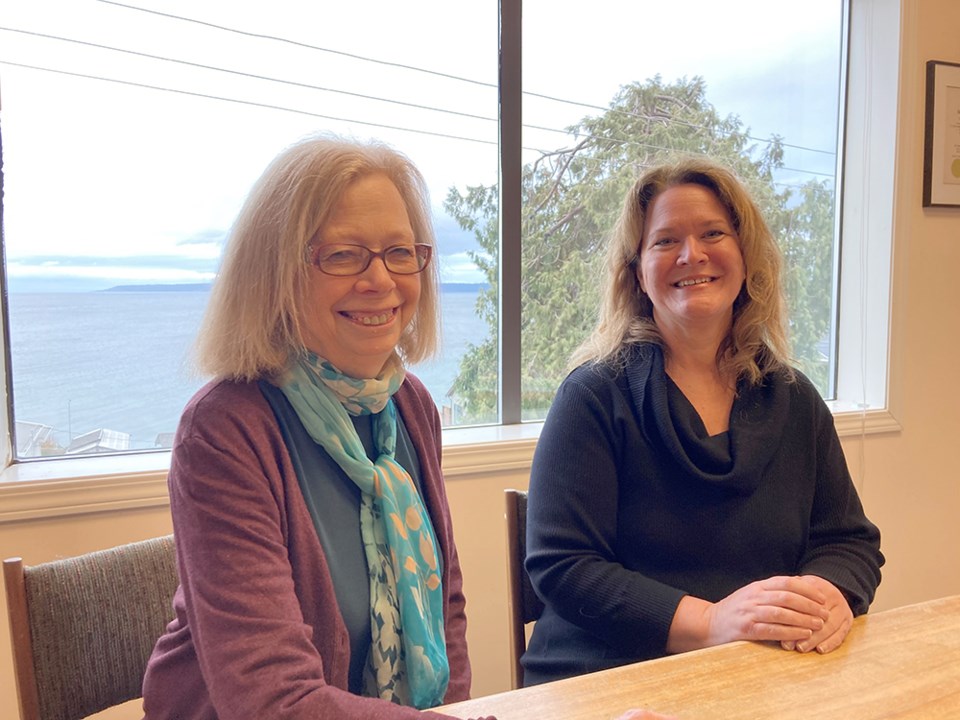Lilla Tipton’s journey alongside people with disabilities began when she was a toddler. That is when her sister Carol was welcomed into her family, the final of five siblings. It’s a journey that will enter a new chapter when the CEO of inclusion Powell River (iPR) Society leaves the agency on June 30.
The announcement of her retirement date and transition to a new CEO was made on Friday, January 7.
“We’re deeply grateful for her expertise, passion, dedication and leadership over the years,” board president David Morris stated in the announcement.
Like many parents at the time who had a newborn with Down syndrome, Tipton’s mother and father were told “you don’t want to bring this baby home. She needs to be put in an institution.”
Tipton watched as her mother advocated for her younger sister, including organizing a school for children with disabilities in Grindrod, BC, that still exists today.
When Tipton was 12, the family moved to the qathet region and she remembers her mom saving coupons as a fundraiser for iPR that began in 1954 when a group of parents fought to have their children attend school and be included in the community.
After graduation, Tipton took some Early Childhood Education courses and spent a year studying at UBC. She moved back to Powell River and then up to Prince George, where she became involved with the development of the HandyDART system through Carefree Society Transportation Services.
“Many users of the service were people who had disabilities,” said Tipton, who subsequently worked on an appeal to the provincial government for funding. Five years later, HandyDART became part of BC Transit.
In 1995, Tipton returned once again to Powell River and six months later began working with iPR as manager of day programs at what was then called Artaban Training Centre. It was attended daily by 50 people in three programs, one for people with complex behaviours, a general one and one for seniors.
In the sheltered workshop environment, attendees produced items such as picnic tables, flowers and hooked rugs. Then provincial legislation was introduced that protected people with disabilities from being paid less than minimum wage.
“Carol was so upset that she wouldn’t be getting her 50 cents a day, that she quit coming and got a job in the community,” said Tipton, whose role involved dismantling the workshop.
She said people with disabilities are still undervalued today when it comes to work.
Tipton is proud of an iPR project that she hopes will become a model for other communities. OneLight, a fire starter manufacturing operation is a social enterprise that requires subsidization. It hires people with barriers to employment, whether they be intellectual or other types, along with people without barriers.
“It’s been exciting to see this develop over the past four years,” said Tipton, “and with another research grant, we are progressing towards the goal for inclusive workplaces.”
CEO years
In 2001, Tipton took on the role of inclusion CEO.
Having gone through many difficult times with funding reductions and various changes, Tipton has led the organization to seek partnerships to provide some financial stability. It includes buying and selling property and analyzing community needs for affordable housing and services for seniors.
As a result, iPR is a major shareholder in Coastal Breeze Village, a 72-unit seniors complex, as well as provider of services for Better At Home, a program to help seniors stay in their homes that is operated from the new Gerry Gray Place, a seniors drop-in centre.
“One of my projects as I leave the CEO position is to formulate a plan for inclusion to take over management of Coastal Breeze, which was part of the plan since the beginning,” said Tipton.
The village was built and is currently managed by Golden Life, a company with 16 other similar facilities.
The society also purchased a former church now called Jean Pike Centre that includes an adult day program, Supported Employment Services, youth outreach services and the ARC Community Event Centre, which is rented out to the public and hosts internal activities such as training special events.
Most recently, people have been moving into the Inclusion Homes apartment complex on Ontario Avenue. With a mix of residents, including those with disabilities, it is managed by iPR.
“It’s an amazing project that we know will turn into a community of its own with families, seniors and singles,” said Tipton.
As one of the top three employers within the qathet region in terms of numbers of employees, iPR is continually hiring.
“We provide people with on-the-job training,” said Tipton. “Recently we have been hiring people from the mill [Catalyst Paper Tis’kwat] and are happy to have them join us.”
Tipton’s involvement with the disabilities sector extended beyond the region. She served for two years on Inclusion BC’s board, which advocates for all the agencies in the province providing services to people with disabilities. And for six years she was an advisory panel member for Community Social Services Employers’ Association, which handles collective bargaining, and spent two years on its board.
New leader
Corinna Curtis, currently director of adult and residential services, will step into the CEO role on April 1. She has been with iPR since 2018.
“I feel great about Corrina becoming CEO,” said Tipton. “She is capable, innovative and has the heart for this work, which is most important. She really cares for people with disabilities and promotes person-centred support.”
Asked what life today in the qathet region would be like for her sister, who died in 2016, Tipton replied, “she would be living independently with support. Carol, like many other people with disabilities, had more potential than was recognized when she was born.”


.jpg;w=120;h=80;mode=crop)


